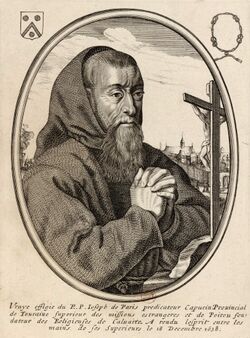Difference between revisions of "Monk"
(Created page with "{{concept |wikipedia=https://en.wikipedia.org/wiki/Monk |image= |constitutes= |interests= }} {{SMWDocs}} ==References== {{reflist}} {{Stub}}") |
(unstub) |
||
| Line 1: | Line 1: | ||
{{concept | {{concept | ||
|wikipedia=https://en.wikipedia.org/wiki/Monk | |wikipedia=https://en.wikipedia.org/wiki/Monk | ||
| − | |image= | + | |image=François Leclerc du Tremblay, le père Joseph.jpg |
| + | |image_caption=[[François Leclerc du Tremblay]], 'Père Joseph', the [[eminence grise]] and agent of [[Cardinal Richelieu]]. | ||
|constitutes= | |constitutes= | ||
|interests= | |interests= | ||
| + | |description | ||
}} | }} | ||
| + | A '''monk''' <ref>ttps://www.perseus.tufts.edu/hopper/text?doc=Perseus%3Atext%3A1999.04.0057%3Aentry%3Dmonaxo%2Fs </ref> is a person who practices religious [[asceticism]] by [[monastic]] living, either alone or with any number of other monks.<ref>https://www.merriam-webster.com/dictionary/monk |</ref> A monk may be a person who decides to dedicate his life to serving all other living beings, or to be an ascetic who voluntarily chooses to leave [[mainstream]] [[society]] and live his or her life in [[prayer]] and contemplation. The concept is ancient and can be seen in many religions and in philosophy. | ||
| + | |||
| + | In the Greek language the term can apply to women, but in modern English it is mainly in use for men. The word ''[[nun]]'' is typically used for female monastics. | ||
| + | |||
| + | Traditions of [[Christian monasticism]] exist in major Christian denominations, with [[religious order]]s being present in [[Catholicism]], [[Lutheranism]], [[Oriental Orthodoxy]], [[Eastern Orthodoxy]], [[Calvinism|Reformed Christianity]], [[Anglicanism]] and [[Methodism]]. Indian religions, including [[Hinduism]], [[Buddhism]] and [[Jainism]] also have monastic traditions as well. | ||
| + | |||
| + | The asceticism does not prevent world interests, including political activism of all persuasions, from [[liberation theology]] to hardline [[nationalism]]; and all kinds of government functions, including [[spies]] or [[diplomat|diplomatic emissaries]]. | ||
| + | |||
| + | |||
{{SMWDocs}} | {{SMWDocs}} | ||
==References== | ==References== | ||
{{reflist}} | {{reflist}} | ||
| − | |||
Revision as of 01:45, 25 February 2021
 | |
A monk [1] is a person who practices religious asceticism by monastic living, either alone or with any number of other monks.[2] A monk may be a person who decides to dedicate his life to serving all other living beings, or to be an ascetic who voluntarily chooses to leave mainstream society and live his or her life in prayer and contemplation. The concept is ancient and can be seen in many religions and in philosophy.
In the Greek language the term can apply to women, but in modern English it is mainly in use for men. The word nun is typically used for female monastics.
Traditions of Christian monasticism exist in major Christian denominations, with religious orders being present in Catholicism, Lutheranism, Oriental Orthodoxy, Eastern Orthodoxy, Reformed Christianity, Anglicanism and Methodism. Indian religions, including Hinduism, Buddhism and Jainism also have monastic traditions as well.
The asceticism does not prevent world interests, including political activism of all persuasions, from liberation theology to hardline nationalism; and all kinds of government functions, including spies or diplomatic emissaries.
An example
| Page name | Description |
|---|---|
| Thomas Merton | An anti-war monk who referred to the US Deep state as "the unspeakable". |
References
- ↑ ttps://www.perseus.tufts.edu/hopper/text?doc=Perseus%3Atext%3A1999.04.0057%3Aentry%3Dmonaxo%2Fs
- ↑ https://www.merriam-webster.com/dictionary/monk |